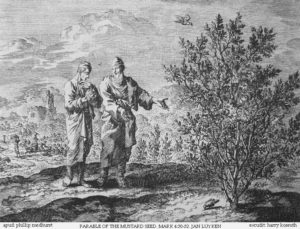Thoughts on Sunday’s Lessons for July 30, 2017

Parable of the mustard seed. Etching by Jan Luyken in the Bowyer Bible (1795), Bolton Museum, Lancashire, England.
The notion of “biblical marriage” gets complicated in Sunday’s first reading, in which we see tricky Jacob marrying Laban’s sisters Rachel and Leah and their two maids! Scripture inspires us, but we still need to filter the culture of the Ancient Near East through tradition and reason before we draw specific lessons for our time. The ancestral legends of the chosen people are products of their time and culture. What remains timeless is the celebration of God’s faithfulness, shown in the stories of Abraham, Isaac and Jacob and their descendants who will go on to populate all nations.
First Reading (Track Two): 1 Kings 3:5-12
Known in tradition for his great wisdom, King Solomon may be most often remembered by the story – just a few verses after this one – of how he revealed the real mother in two women’s dispute over a baby by proposing to cut the infant in half. Here we meet Solomon – the son of King David and Bathsheba – as the young, new king, uncertain and uneasy. Dreaming of God asking what he would like to be given, Solomon chose not long life, riches or power, but only wisdom to govern the people well. Pleased by this choice, God grants Solomon a wise and discerning mind greater than any earlier or later king.
Psalm (Track One): Psalm 105:1-11, 45b
This ringing hymn of praise to God and God’s works celebrates God’s promise that we have seen come to pass in this season’s first readings: God made an everlasting covenant with Abraham, Isaac and Jacob – a covenant that we will later see worked out with Moses and the people at Mount Sinai. God promises that their children will inherit the Promised Land for a thousand generations, and this will be in response to their covenant to faithfully follow God’s teaching and obey God’s laws.
Alternative Psalm (Track One): Psalm 128
This short alternative Psalm echoes similar ideas without touching on the people’s ancestral covenant in so many words. Still, its quick cadences celebrate the joy and the rewards that come to those who follow in God’s way, the fruits of their labor, the happiness and prosperity that they will enjoy. Thanks to God’s blessings from Zion, they will be rewarded with secure homes and long and prosperous lives.
Psalm (Track Two): Psalm 119:129-136
The longest of all the Psalms, this celebration of love for God’s law and teaching that comprises the first five books of the Bible is repeated often in brief selections through the Lectionary year; another passage was used in Track One just two weeks ago. This week’s verses celebrate the love of Torah in almost sensuous terms of open-mouthed, breathless longing. God’s statutes are so wonderful that the Psalmist bursts into tears at the recognition that some people do not follow the law.
Second Reading: Romans 8:26-39
Our extended journey through Paul’s letter to the people of Rome reaches a high point in this passage, as his long discussion about life in the flesh versus life in the spirit reaches its conclusion in a burst of almost poetic words: If God is for us, who is against us? God’s abiding faithfulness, as we have seen in the First Reading and Psalm, was made manifest through God’s gift of God’s own son. If God gave him up for all of us, nothing in all creation, not hardship, or distress, or persecution, or famine, or nakedness, or peril, or sword can separate us from the love of God through Jesus.
Gospel: Matthew 13:31-33, 44-52
What is the kingdom of heaven like? Today we hear Jesus offering five more striking, thought-provoking concepts in a quick series of parables. It’s like a tiny mustard seed that grows into a tree! It’s like yeast that makes bread rise! What’s more, it’s like buried treasure, a proud merchant with a valuable pearl, and fishers with a full net. All this concludes with another warning that a fiery furnace, weeping and gnashing of teeth wait for evildoers. Parables don’t tell us the whole story – they only offer flashing images – but every one of them makes us think.
